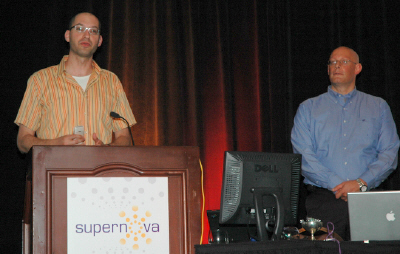Supernova: Yahoo flexing research muscles

Usama Fayyad, Yahoo’s chief data office, pitched his company’s reseach prowess at Supernova 2006. He is putting together what he described as the largest, deepest and smartest research group studying search, community, personalization, user engagement, interactive content and information navigation. The logic to getting into an brain race with Google and Microsoft is that the runway to solving search-related problems is long. Yahoo even has a bold mission statement to go along with its research efforts: Where the Internet's Future is Invented.
Whether Yahoo can live up to it mission remains to be seen but there is endless room for improving the user experience on the Web in many dimensions. Search today is at a primitive stage, Fayyad said. "If you type in 'New York,"' it looks like 'new,' as in 'new car,' and 'york' looks like 'york' [to the machine]. The search engines use simple techniques to circumvent the problem, but it's not a breakthrough. "We can serve up a lot of queries by understanding who you are," Fayyad explained. As people browse, the system could figure out what you might be interested in, based on actual knowledge of what you are about and what mode or mood, such as commercial or social, you are in, he said. "User personalization will change things, and a lot of interfaces can be verticalized and made more natural.," he added. However, figuring out the visual interface will be dfficult, he cautioned.

Mor Naaman of Yahoo Research and Usama Fayyad, Yahoo chief data officer
Yahoo has a lot of usage data to apply to its research--12 terabytes a day, which the company is using to improve search results, targeting and ad and marketing solutions. Mor Naaman of Yahoo Research demonstrated a new research project on Flickr, called ZoneTag, which annotates images from camera phones with location data (from cell towers or GPS). Suggested tags can be generated for each photo based on tags the user submitted for similar content (time, location) and tags from a others in a user's social network, as well as related information, such a nearby restaurants. The social search feature could be also look at a user's calendar and compare it to the photo data, such as date, time and location, as a way to suggest tags and related information. "The point is we don’t expect users to figure out what to tag," Fayyad said. "We try to guess or make it easily selectable."
Social search could also be used to cluster images, such for the term "jaguar," which can be a car, animal, guitar or plane. "Writing an algorithm that figures what an image is about is very hard, but you can have a breakthrough leveraging the wisdom of crowds. Flickr tags can do clustering easily and naturally," Fayyad said.